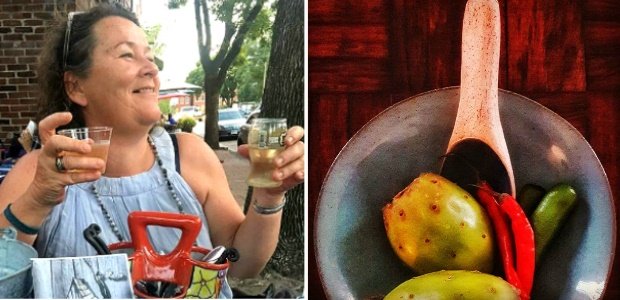(images: Supplied)
Suzi Holtzhausen is no stranger to food. She’s been in the culinary industry for three decades with many unique experiences under her belt. Her latest venture involves running a pop-up cooking school / food camp. The idea is that for a few days, you and your friends or family can travel to an exciting destination and get to learn all about open-fire cooking, using sustainable and local ingredients with Suzi as your trusted guide.
We chatted to Suzi about what you can expect!
You’ve had quite an illustrious cooking journey! Can you take us briefly through it and what were some of your highlights?
After Silwood Kitchen in the 80s and a couple of restaurant stints in the Mother City plus a year of cooking on Crete, the African wilds were calling. The early 90s saw the SA Safari luxury destinations grabbing the attention of the foreign market. Expectations were high, and bush dinners became my signature. This led to planning new lodges, including; – kitchen design, un-skilled staff training and from time to time laying one earth brick upon another.
Jozi was a most central choice for my next venture to continue bush cooking whilst setting up Barnes Street Culinary Studio. The old corner store in Brixton provided a social environment for a professional 12-month cooking course. They spanned over 10 years. Part-time students enjoyed creatively participating in street food pop-ups, open-air brunches at Sterkfontein Caves, exclusive rooftop dining in Sandton and many more. Most importantly many who passed through the studio have become big-time friends.
The pull of the Ocean was strong and a move to the Cape wild West Coast followed. Perhaps Paternoster reflected me back to the wondrous time in Greece and this small became home. Foraging on the dunes and travelling dinners filled the days of the yet undiscovered fisherman’s haven. As popularity increased a, a derelict on-the-beach cottage became Gaaitjie, the restaurant. The inner workings were a most brilliant local team of ladies who made it their own, they would be an asset to any restaurant nowadays, worldwide!
What motivated you to leave the restaurant business?
Food is fabulous and it can take you anywhere you want to be work-wise unless the nuts and bolts are not working well together you will not have success. Creative must work in sync with the administration, that is the reality. To have a successful business is to start, battle, achieve, succeed and sell.
Can you tell us in your own words what you do now?
I am a free food agent, mastering in culinary psychology, enjoying travel fare!
What do you love about your new venture?
Travel, food adventures, menu creation, occasional dining experiences and helping people in the food biz to improve their product – happiness.
What can guests expect from your pop-up cooking schools?
Our time together will not be spent behind the confines of a recipe or complicated kitchen equipment. Free-form cooking if you will! The experience will include:- appreciation of local ingredients, getting your hands dirty, fun around an open-air fire, all ending in delicious social food tables in the Mess “Marquee”, before relaxing under the stars to reflect on new foodie tips and hints, then falling into a comfy bed in a spacious tent for a good rest!
Can anybody come – even if they can’t cook?
We all have one thing in common and that is to eat! A care and love of good food are all you need no matter your age!
What are the three ingredients you can’t live without?
Berg Rivier Botter Sout from Jan, olive oil from a source with provenance and… hmmm, can’t choose the last but it’s a toss-up between fresh bay, wild herbs or fire roasted, crushed cumin seeds.
Where do you get your inspiration from?
Travel and the environment and the odd food craving.
If you could give anyone only one piece of cooking advice – what would it be?
Practical kitchen advice- always grout your kitchen tiles in a dark colour and cooking wise- always heat a pan before adding any oil/butter for frying foods.
When thinking of sustainable and eco-conscious cooking and eating, what tips do you have for minimising wastage in the kitchen?
Buy seasonal ingredients, process and preserve, source basic larder supplies from a plastic-free supermarket and reuse glass containers to fill up, learn to make a good stock for further cooking using up vegetable peelings etc ( we could compost, however, there is not that much water to grow for now in the Cape).
ALSO READ: 17 Clever ways you can save water in your kitchen right now
Keen to attend one of Suzi’s pop-up cooking schools? Find out more information!

